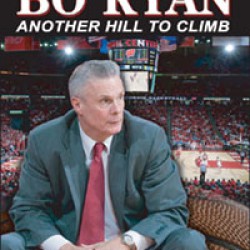Bookshelf: Spring 2013
Tom Hager ’10 of Green Bay, Wisconsin, has written 368 pages of madness: a book on the history of the NCAA tournament called The Ultimate Book of March Madness: The Players, Games, and Cinderellas that Captivated a Nation (MVP Books). It’s a year-by-year look at the stories behind each tournament, plus a section on the one hundred greatest games of all time. “For a [then] twenty-two-year-old — I graduated at twenty — to accomplish all of this [exhaustive research and a national book tour] reflects pretty well on the university,” he says.
From Frank Smoll MS’66, PhD’70 comes his thirteenth book, Parenting Young Athletes: Developing Champions in Sports and Life (Rowman & Littlefield). It explores both the joys and dangers of sports participation and translates the latest wisdom on the subject into a practical, how-to guide that helps parents to ensure that their children get the most out of the game. The author is a psychology professor at the University of Washington in Seattle.
Steve Raymer ’67, MA’71 writes that he’s had “two long careers”: twenty-four years as a National Geographic staff photographer, working in more than one hundred countries; and the more recent, sixteen-year stint as a professor of journalism at Indiana University in Bloomington, and on the faculty of its East European Institute and India Studies Program. His fifth book since entering academia is the five-year photographic project Redeeming Calcutta: A Portrait of India’s Imperial Capital (Oxford University Press). Raymer’s compelling photos and detailed text create an “inclusive and nuanced portrait” of both decay and hope in the storied colonial metropolis and cultural capital that seeks to reclaim its past glory.
Have you ever wondered about the people who stand behind great people and help to make them great? Martin Drapkin MA’70 of Cross Plains, Wisconsin, explores such relationships in his second book, a work of historical fiction called Ten Nobodies (and their somebodies) (Dog Ear Publishing). In it, Drapkin creates first-person narratives by fictional “nobodies” such as Davy Crockett’s spiritual adviser, pirate Anne Bonny’s masseur, General Custer’s hair stylist, Marilyn Monroe’s fortune teller, Vince Lombardi’s spy, and more.
Seeing a need for a book that would provide businesspeople, managers, and students of business with proven, practical answers to common problems, Eric Bolland ’74, MA’78 compiled and co-edited the work of fifteen of his business-faculty colleagues at Midway [Kentucky] College to publish Solutions: Business Problem Solving (Gower Publishing). Bolland, chair of Midway’s business division, also authored several chapters.
Bill Hewitt ’76 says that his is “a story that has not previously been adequately told: the story of the developments, trends, and visionary people who are, in many ways, mitigating the climate crisis and turning sustainable development into reality, not just a grand concept.” He tells this story in A Newer World: Politics, Money, Technology, and What’s Really Being Done to Solve the Climate Crisis (University of New Hampshire Press). Hewitt is an environmentalist, activist, the principal of Hewitt Communications, and an educator at New York University’s Center for Global Affairs.
Tim Myers MA’76’s new e-book is Glad to Be Dad: A Call to Fatherhood (Familius). It’s a realistic, humorous, practical, and heartwarming look at the realities facing American families and the ways in which challenges and opportunities are evolving for men and women. Myers writes children’s literature, poetry, songs, fiction, nonfiction, and science fiction, and lectures at Santa Clara [California] University. He can also whistle and hum at the same time.
Surely it won’t be long before Jon Krampner MA’77’s third book joins the pantheon of pop-culture food histories, because Creamy and Crunchy: An Informal History of Peanut Butter, the All-American Food (Columbia University Press) is the first general-interest book on the subject. It’s been a long time in the making, but for those who live in one of the 75 percent of American households where this comfort-food icon resides, it’s been worth the wait. The book was the subject of a New Yorker blog post in November and a praise-filled Los Angeles Times review in December. The L.A.-based author guarantees that the book will not stick to the roof of your mouth.
Residents of and visitors to Wisconsin often seek out its “thumb,” the picturesque Door County peninsula. And when they do, Magill Weber JD’03’s Door County Outdoors: A Guide to the Best Hiking, Biking, Paddling, Beaches, and Natural Places (University of Wisconsin Press) will be there to help. Her resource helps visitors to make the most of the county’s 298 miles of Lake Michigan shoreline, state parks, cozy inns, attractions, and “secret spots” with 125 detailed maps and suggestions of more than 150 scenic routes to explore. The author is a project director for the Nature Conservancy in Phoenix.
Reece Jones MS’04, PhD’08 seeks to demonstrate that the “exclusion and violence necessary to secure the borders of the modern state often undermine the very ideals of freedom and democracy they are meant to protect” in Border Walls: Security and the War on Terror in the United States, India, and Israel (Zed Books). Jones is an associate professor and the chair of graduate studies in the geography department of the University of Hawaii-Manoa in Honolulu.
In addition to hosting a weekly podcast with chef Andrew Zimmern of the Travel Channel series Bizarre Foods, Molly Mogren ’05 has also co-written three books with him. Their latest is Andrew Zimmern’s Field Guide to Exceptionally Weird, Wild, & Wonderful Foods (Feiwel & Friends), which is aimed at kids but will please grown-ups, too. Mogren is the director of communications at Food Works in St. Louis Park, Minnesota.
When Susan Stuntzner PhD’07 injured her spine at age nineteen, there was little information available to her on how to adapt. Now her first book, Living with a Disability: Finding Peace amidst the Storm (Counseling Association of India), fills that void so well that it’s being adopted as a textbook. Stuntzner is the program coordinator and an assistant professor for the rehabilitation counseling and human services program at the University of Idaho-Coeur d’Alene. Her second book is Reflections from the Past: Life Lessons for Better Living, and she’s at work on a third.
The transmission of the plague from marmots to humans in 1910 ultimately killed as many as sixty thousand people in less than a year. Now author William Summers ’61, PhD’67, MD’67 has examined the actions and interactions of the multinational physicians, politicians, and residents who responded to it — and the lessons they provide for our own age — in The Great Manchurian Plague of 1910–1911: The Geopolitics of an Epidemic Disease (Yale University Press). Summers is a professor of the history of science and medicine, molecular biophysics and biochemistry, and therapeutic radiology at Yale University in New Haven, Connecticut. He’s taught at Yale since 1968 and says he’s “still excited to be in the classroom and has no plans to retire.”
In The Making of Black Detroit in the Age of Henry Ford (University of North Carolina Press), Beth Tompkins Tiller Bates ’71 writes that in the 1920s, Henry Ford hired thousands of African-American men to fill jobs that initially seemed to offer them a chance at greater economic security. When the workers came to see that Ford’s anti-union stance did not allow them full access to the American Dream, however, their loyalty eroded; they sought empowerment through a broad activist agenda; and they played a pivotal role in the UAW’s challenge to Ford’s interests. Bates, a professor emerita at Wayne State University in the Motor City, concludes that Ford and his company helped to kindle the civil-rights movement in Detroit without intending to do so.
As a citizen of the Cherokee Nation, and collaborating with a group of elders, storytellers, and knowledge-keepers, Christopher Teuton MA’95, PhD’03 has recorded the first collection of interwoven stories, conversations, and teachings about Western Cherokee life, beliefs, and the art of sharing oral history in more than forty years: Cherokee Stories of the Turtle Island Liars’ Club (University of North Carolina Press). One reviewer called it “easily one of the most important books on the Cherokee worldview and tradition ever written.” Teuton is an associate professor of American Studies at the University of North Carolina at Chapel Hill.
“Rehabilitating the lowly worm into a powerful aesthetic trope, Janelle Schwartz [MA’01, PhD’08] proposes a new framework for understanding such a strangely animate nature,” says the University of Minnesota Press about Schwartz’s new book, Worm Work: Recasting Romanticism. In short, it examines the worm as an archetypal figure in literature, natural history, and taxonomy. The author is a visiting assistant professor of comparative literature at Hamilton College in Clinton, New York.
Forever Young: The Rock and Roll Photography of Chuck Boyd (Santa Monica Press), edited by Jeffrey Schwartz ’02, showcases the work of one of the entertainment business’s most trusted and well-liked photographers, and captures the Zeitgeist of rock during the 1960s and ’70s. Boyd passed away in 1991, leaving behind nearly thirty thousand images; some of these have been discovered only recently and are included in the book. A lifelong musician, Schwartz is also a music historian and the archive director for the Chuck Boyd Photo Collection in Santa Monica, California. His first book was The Rock & Roll Alphabet.
Anyone who knows a family in which a child — and therefore his or her parents — are living with diabetes will relate to Linda Rupnow Buzogany ’88, MS’93’s The Superman Years: The Emotional Life of a Parent Caring for a Child with Type 1 Diabetes (CreateSpace). The Littleton, Colorado, author is a psychotherapist and psychology professor who recounts her family’s early experiences with this daunting disease and offers ways to cope with the long-term emotional and physical burdens. One reviewer writes, “Finally, a book about what happens for the parent who is trying to keep her child alive.”
Author William Kaiser ’49 says that his historical novel Hellebore: A Novel of Reconstruction (Canterbury House Publishing) is a “dramatic story about the fussing, fighting, and feuding that shaped the lives of Southern Appalachia folk after the American Civil War.” It’s a sequel to his book Bloodroot, about how the outbreak of the Civil War divided Appalachia. Kaiser, of Deep Gap, North Carolina, has spent sixty-three years as a journalist and writes a column for the Boone, North Carolina, Watauga Democrat.
Impossible Journey: The Story of the Victoria Land Traverse 1959–1960, Antarctica (Geological Society of America) is co-author Jack (John) Weihaupt, Jr. ’52, MS’53’s account of a four-month, 2,400-kilometer, scientific and historical adventure into an unexplored hinterland that was conducted as part of the International Geophysical Year/U.S. Antarctic Research Program. The journey nearly ended in catastrophe several times, but the team succeeded in making discoveries and gathering important data. Weihaupt is a professor emeritus of geography and environmental sciences at the University of Colorado-Denver.
In (Ethel) Janet Mossberg Kramer ’55’s The Sion Grail (Xlibris), a woman visiting Paris discovers a priceless grail that belongs to a secret society and is sought by a greedy collector. Her search for its origin brings romance, adventure, and life-altering challenges. Kramer is a former English and French teacher who has run for the Minnesota House of Representatives. She lives in Minnetonka.
The University of Chicago Press has published new works by three Badger authors: Extreme Measures: The Ecological Energetics of Birds and Mammals, by Brian McNab MS’58, PhD’62, a professor emeritus of biology at the University of Florida in Gainesville; Michael Polanyi and His Generation: Origins of the Social Construction of Science, by Mary Jo Mann Nye ’65, PhD’70, a professor emerita of the humanities and history at Oregon State University in Corvallis; and Social Knowledge in the Making, co-edited by Neil Gross MS’96, PhD’02, a professor of sociology at the University of British Columbia in Vancouver.
Judy Radloff Shuler ’63 walked to Camp Randall Stadium to attend football games a century after John Muir x1863 passed through the original Camp Randall, then filled with the Civil War’s trainees, wounded, and incarcerated. Shuler’s life intersected with Muir’s many times afterward during her “forty-five-year odyssey in Alaska,” starting in 1965: inspired by his Travels in Alaska, she established a tour and travel-planning business in Juneau, which she ran with a colleague. Now living in Fredonia, New York, Shuler has written the philosophical Red & Blue: A Memoir of Two Alaskan Tour Guides (Ouzel Press).
Sorrel Doris Hays MMusic’68 is a pianist, composer, filmmaker, consultant, and international performer of contemporary music who has lectured at many universities (and is currently at the University of West Georgia). Her new book is Touching Sound: Living Lullabies (Kendall Hunt), which includes fifty-eight musical scores and two CDs of eighty-four original recordings. Starting with the simple lullaby form, Hays expands to more complex forms, explores the effect of sound on the body, and ultimately provides a refreshing approach to understanding music.
Bringing together researchers and practitioners to provide a broad set of perspectives and strategies, Robert Ludke ’68, MS’71, PhD’80 has co-edited Appalachian Health and Well-Being (University Press of Kentucky). Contributors propose recommendations for research, policy, and best-practices models to improve the quality of life and decrease inequities for both rural and urban Appalachians.
From Toronto, Herman Rosenfeld ’71 writes that he’s contributed a chapter called “American Social Democracy: Exceptional but Otherwise Familiar” to the newly published Social Democracy after the Cold War (Athabasca University Press). The work discusses “the demise of social democracy as a movement for social transformation and the rise of Third-Way forms of political movements on the left,” and offers case studies from several countries.
Congratulations to Rodney Wittwer ’81 of Medford, Massachusetts, on publishing his first book of poetry, Gone & Gone (Red Hen Press). The poet has also received a 2012 artist fellowship from the Massachusetts Cultural Council.
Dickeyville (Starhaven) is “both allegory to Theseus’s myth and paean to the Midwest and state of Wisconsin,” says its author, Joe Abbott ’83. How so, exactly? When a self-satisfied Californian arrives in Dickeyville, Wisconsin, to meet his fiancée’s family, a cast of bizarre locals take the hesitant New-Ager to hunt for the Dickeyville Horror, a giant boar. He mocks these provincial villagers, but soon learns that “hubris has a price.” In 1980, Abbott somewhat reluctantly followed his then-girlfriend/now-wife from California to Madison, where his future in-laws were all involved with the UW. He now lives in Chico, California, and teaches language arts at Butte College.
If you can’t resist a good zombie story, why not try the paranormal suspense thriller Cocaine Zombies (Camel Press), by attorney and debut novelist Scott Lerner ’89 of Champaign, Illinois? In it, lawyer Samuel Roberts meets a prospective client who’s accused of selling cocaine and an exotic beauty who’s paying for his defense. Soon after, Roberts begins having nightmares that come true, and life becomes exceedingly disturbing. Together with his supernatural-minded friend, Bob, he must confront the forces of deepest evil.
Eric Lohr ’90 has drawn on untapped sources in the Russian police and foreign-affairs archives to craft Russian Citizenship: From Empire to Soviet Union (Harvard University Press). He explains how the reform of citizenship laws in the 1860s encouraged foreigners to help modernize Russia by immigrating and conducting business there — until a severe reversal came during World War I. Lohr is the chair of Russian history and culture at American University in Washington, D.C.
This Ordinary Adventure: Settling Down without Settling (InterVarsity Press) juxtaposes Christine Sorensen ’99 and Adam ’00 Jeske’s experiences traveling the world for the better part of a decade doing missions and community-development work, with their lives years later: managing careers and a family back in the “land of malls and manicured lawns.” They seek to think and live differently because of their time abroad, and to retain the amazing parts of those experiences. Adam is the communications director for InterVarsity Christian Fellowship in Madison, and Christine is earning her PhD in anthropology.
Brigham Young University assistant professor of history J. (John) Spencer Fluhman MA’00, PhD’06 provides a “comprehensive history of anti-Mormon thought and the associated passionate debates about religious authenticity” in his new work, “A Peculiar People”: Anti-Mormonism and the Making of Religion in Nineteenth-Century America (University of North Carolina Press). He documents how the denomination became a social enemy for a populace agitated by other forces, and how its transformations eventually sapped the worst of the vitriol, helping to trigger the acceptance of Utah as a state in 1896 and paving the way for further acceptance.
When the heroine in Irene Helenowski MS’01’s Order of the Dimensions (Lulu) began her graduate studies in physics at Madison State University in Wisconsin (notice any resemblance?), she couldn’t possibly imagine that her work would take her into a multitude of dimensions, all leading to different outcomes — with plenty of danger along the way. The Chicago author is a statistical analyst at Northwestern University’s Feinberg School of Medicine.
Published in the Spring 2013 issue























Comments
Jerold Last March 7, 2013
How about a series of mystery stories set in South America featuring Los Angeles based private detective Roger Bowman and wife Biochemist Suzanne Foster? University of California, Davis Professor of Pulmonary Medicine Jerold Last BS’59, MS’61 sets his hard-boiled mysteries in Montevideo, Uruguay and the surrounding Mercosur region countries. Titles (Amazon Kindle) include The Ambivalent Corpse, The Surreal Killer, The Matador Murders, The Body in the Bed, and The Body in the Parking Structure. The next entry in the series should be published in Spring, 2013.
Tags: Alumni, Books